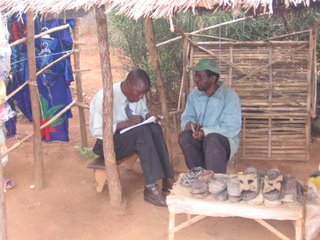Go Black Stars!!!!
As I am sitting down to write this email, Ghana and Brazil are about to take to the field for their 2nd Round Match at the World Cup. The reason I am so excited about this game is that Ghanan “Black Stars” are the only African country to qualify for the second round at this year’s tournament and are the overwhelming sentimental favourite for myself many of my friends here in Mozambique. Over the past two weeks I am allowed myself to be carried away with this football mad country. When Cremildo and I were up in Quelimane and Nampula, we closely followed the results and regularly congregated at the local watering holes to take in the action. Many of the store owners in town would leave televisions on in the display window and in some cases there would be up to a hundred people all crowded around to try and get a view of their favourite players.
Football simply unites Africa, providing these countries with an opportunity to show the world that there is more to the “dark continent” then just starvation, disease and war. Football seems to encapsulate the living soul and the eternal optimism of a people focused on a brighter future. Look at how Angola was able to reach the world’s highest tournament only three years after emerging from 22 years of brutal civil conflict where the country was nearly ravaged for all its worth. Or look at how the Ivory Coast was able to broker a ceasefire in their civil hostilities as their country qualified for the championships. Or Ghana, a team nearly everyone picked to finish last in their pool, proudly displaying that they can compete quite effectively on the world stage, even disposing of the USA and the Czech Republic along the way!!
The Great Pele was convinced that an African team would win the world cup by the start of the 21st century…so here’s to Ghana in their bid to carry out that bold prediction and satisfy the hopes and dreams of an entire continent. It’s not just pride on the line here but a heavy dose of respect and defeating the mighty Brazilians, although a tremendous feat indeed, would provide a monumental boost to not only this West African country but the continent as a whole.
As for me, I am pounding away at my computer back here in Maputo after a fantastic week and a half in the field. There is much to do in the next few days as I anxiously look towards my two week holiday back home in Canada. If any one would like anything special from Mozambique, I guess now would be the time to ask for it!!

